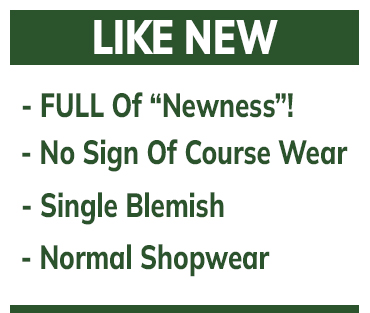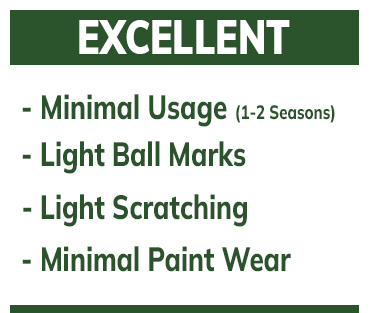

Table Of Contents: Golf Irons Buyer's Guide
What Golf Irons Should You Buy?
When choosing golf irons, consider your skill level and other iron specifics, like the types of shafts and clubhead design. Also, consider the set's composition and size, your budget, and your brand and personal preferences.
Golf Irons Buying Tips
A large portion of your golf game is spent getting across the fairway to the green. In many cases, the irons are calibrated for the different distances you will run into as you make this approach. And this is where your irons become essential. Like in all categories of clubs, there are certain things you want to consider during selection. Irons are no different. Understanding the basics of this utility club can positively impact your game. Here are a few basics to help you decide.
Golf Iron Selection By Skill Level
While the maximum number of clubs you should carry in your bag is 14, how those clubs are selected is essential. While there are guidelines as to which clubs you should have, there is some flexibility in your equipment lineup. Although some clubs are crucial, you can alter the mix between woods, irons, wedges, and hybrids. And doing this is highly recommended since players have different skill levels and needs.
Every golfer, of course, will carry irons in their bag. The question is which ones, and how many? Technology has made this process even more involved. The advent and development of hybrid clubs have created a substitute that is easier to use than many lower-numbered irons. That being said, a great way to select which irons, or hybrids, to use is to look at experience and skill level.

Beginner Or Higher Handicap Golfers
Beginners, novices, and players with slower swing speeds will have one of the most complicated relationships with the irons and hybrids. Lower irons can be challenging to hit with accuracy. They tend to be unforgiving. For this reason, many sources will tell you to skip the lower irons and use the 3-hybrid and 4-hybrid. For shots deeper into the fairway, a novice player should have a 6-iron, 7-iron, 8-iron, and 9-iron. You could get by with a 7-iron or 9-iron if you are more of a recreational player.
Intermediate Golfers
As players gain more experience or have a higher swing speed, they have more options for what irons to carry. While you may start including lower-numbered irons, you must ask yourself an important question. Do you want to? The ease of use of a 3-hybrid and 4-hybrid can allow you better shots when you are on the beginning fringes of the fairway but need an accurate low loft. As you move closer to the green, you want to ensure you have all four higher-numbered, higher-lofted irons. Unlike a beginner player, you want the precision of the higher lofted irons.
Advanced Or Lower Handicap Golfers
If any player will make the most use of the irons, it is the advanced or pro player. A seasoned player with a fast swing and low handicap can deftly use this group of clubs with precision on the fairway. That said, advanced players will carry a full set of irons, including the lower ones. More advanced players can choose to interject a hybrid or hybrids into the lineup as needed to infuse the benefits of this club into their game.

Understanding Irons
Not to oversimplify the iron family, but it does help to break them up into subcategories. You probably have heard the term long iron, mid iron, short iron, or wedges. These are a more granular breakdown of the different clubs that make up this group. Accordingly, the loft is the most significant change between irons within a set of irons. The loft, of course, is the angle of the club head. The iron loft increases as you go from the long or lower irons to the short irons, also known as wedges. Simply put, the ball's arc gets sharper and higher as you move closer to the hole. A higher arcing ball flight helps ensure you don't overshoot the green.
Cavity Back Versus Muscle Back
The club head is one of the most critical parts of the club. For irons, the two principal styles are cavity back and muscle back. The muscle back is the traditional style of the club head in an iron. It is thinner and solid. And it appeals to more advanced players for several good reasons. For example, muscle back irons offer an incredible feeling when you contact the ball, giving the golfer feedback when they hit it. And this can be ideal for a golfer that is consistent with their stroke. However, a drawback of this club is that it can be very unforgiving. That brings us to the cavity back iron.
The cavity back is the right choice for a less experienced or skilled player. It is designed to be more forgiving with a much larger striking area. And this can help you make more shots. Cavity backs are also constructed with a lower center of gravity, which can help players generate more speed and velocity when they strike the ball. Some cavity backs can also have precision weighting to help you hit the ball straighter.
Also, many irons today can be a hybrid mix of cavity back and muscle back and fall, more or less, into both categories. There are also "game improvement" irons that use more perimeter weighting, providing more casual or novice players with more shot forgiveness.
Graphite Or Steel Shaft
Another component to consider with iron selection is the club shaft. The two predominant choices here are graphite and steel. Both have different characteristics to match different styles of play. The steel shaft is heavier and favors players with higher swing speeds. The lighter graphite shaft is better for players with a slower swing speed who need to generate more power.
Individual Irons Versus A Full Set
Another question determining what you purchase is the number of irons you buy. You can purchase an individual iron or a complete set of irons. Naturally, when you are a beginner or buying your first set of clubs, you must ensure you have the entire set. But for golfers who already have their irons, it may make sense to buy them individually based on the specific situations they frequently face on the fairway.

Certified Pre-Owned Irons
Every Golf Irons is different, and you should be able to take advantage of the brand and model that best meets your requirements. The golf club that performs well for the pros on tour may not be the same club that works best for all golfers. You should be able to try different clubs to find the best one for your individual playing style. That is also why buying Pre-Owned Clubs is such an excellent and practical solution.
You do not have to purchase new to get a name-brand quality wedge. Our certified pre-owned irons offer top-name brands at a lower price point. Many are also backed with our Certified Pre-Owned Guarantee. Each used club we receive is meticulously inspected and rated appropriately.
Click on the pre-owned categories below to find out more!
The Main Takeaway?
Golf Irons are the most common club in any golf bag. So understanding golf irons and how they can affect your game is essential. Will your game benefit from a set of cavity back irons or muscle back? Or would a "game improvement" iron set be better for you? With so many options, it may also be advantageous to get fitted at your local golf pro shop. Plus, you may want to consider pre-owned irons, but buy from a reputable dealer so you can be certain what you are buying. Whatever you do, getting the best irons for you and your playing style is crucial to keep you playing your best!
Best Golf Irons For 2025
Modern golf manufacturers add a new dimension to modern golf irons. Using today's technology, clubmakers can create irons that are easier to hit and more accurate. These are some of the most popular individual irons and iron sets.





